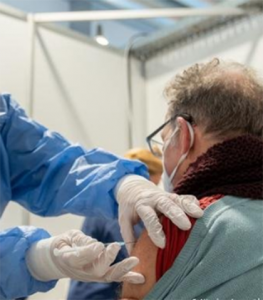Migrants among the most concerned by COVID – ABS survey
Migrants and people with disability have been the most likely in Australia to be impacted emotionally by the COVID-19 pandemic, according to new data from Australian Bureau of Statistics (ABS).
A survey by the ABS of attitudes to COVOD carried out recently asked who felt overwhelmed by COVID-19.
 Thirty-three per cent of women said they were while just 23 per cent of men did.
Thirty-three per cent of women said they were while just 23 per cent of men did.
For people aged 18 to 64 years, 30 per cent said they were overwhelmed while just 20 per cent of those aged 65 years and over did.
Of people born overseas, 37 per cent were overwhelmed, while of those born in Australia, just 24 per cent were.
People with disability recorded 32 per cent rate of feeling overwhelmed while the figure those without disability was 26 per cent.
For the whole population, 28 per cent of people said they were overwhelmed, compared with 56 per cent six months ago.
More than four in five (84 per cent) people rated their understanding of their own state or territory’s recommendations and restrictions as very good or good.
And almost all Australians (95 per cent) reported that they were following their own state or territory’s recommendations and restrictions to help prevent the spread of COVID-19.
Victorians were most likely to be following restrictions ‘exactly’ with 36 per cent followed by South Australia (34 per cent), New South Wales (22 per cent), Queensland (25 per cent), Western Australia (27 per cent) and the rest of Australia (Tasmania/Northern Territory/Australian Capital Territory) (28 per cent).
More than three quarters of people (78 per cent) trusted other people to follow their state or and territory’s recommendations and restrictions to help prevent the spread of COVID-19.
The survey found 73% of people agreed or strongly agreed that they would get a COVID-19 vaccine. Migrants were more likely to want a vaccine (86 per cent) than Australian born respondents (74 per cent).
“The most commonly reported factors that would ‘very much’ or ‘completely’ affect the decision to get vaccinated were whether the vaccine has been in use for a long time with no serious side-effects (67 per cent) and whether it is recommended by their GP or other health professional (61 per cent),” the report said.
The main concerns of those who didn’t want a vaccination were relating to potential side-effects (82 per cent) and effectiveness of the vaccine (61 per cent).
Almost four in five (79 per cent) people agreed or strongly agreed that a vaccine can help control the spread of COVID-19.
The survey found 31 per cent of people reported they thought about COVID-19 several times a day, 21 per cent once a day, 24 per cent several times that week and 16 per cent once in that week.
The survey found those who thought about COVID-19 several times a day in the last week were more likely to be: people aged 65 years and over (36 per cent); people in Victoria (38 per cent), and; people with disability (39 per cent) or a long-term health condition (39 per cent).
Six months ago, over half (56 per cent) of people thought about COVID-19 frequently.
See the full report here:












